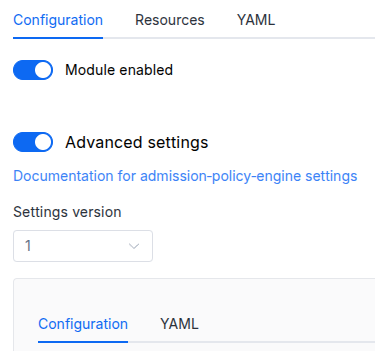The module lifecycle stage: General Availability
Available with limitations in: CE
Available without limitations in: SE+, EE
Requirements
To the Deckhouse version: 1.74.2 and above.
To the versions of other modules:
-
cni-cilium: any version.
Parameters
Schema version: 1
-
-
objectsettings.auditParameters for audit controller.
-
booleansettings.audit.enabledEnable audit controlller.
Default:
false
-
-
objectsettings.dvcrOptions for settings up Deckhouse virtualization container registry. Internal service for storing all vms images.
-
objectsettings.dvcr.gcParameters for garbage collection.
-
stringsettings.dvcr.gc.schedule
Schedule to run garbage collection procedure that remove stale images for
ClusterVirtualImage,VirtualImage,VirtualDiskresources deleted from the cluster.Default schedule is not defined. Specify schedule to enable garbage collection.
-
-
objectsettings.dvcr.storage
Required value
Options for setting up storage.-
objectsettings.dvcr.storage.objectStorageParameters for objectStorage.
-
objectsettings.dvcr.storage.objectStorage.s3Parameters for S3.
-
stringsettings.dvcr.storage.objectStorage.s3.accessKey
Required value
accessKey must be base64 encoded. accessKey is a unique identifier that identifies you as a user with access to S3.Pattern:
^[A-Za-z0-9+/]*={0,2}$Example:
accessKey: YWNjZXNzS2V5Cg== -
stringsettings.dvcr.storage.objectStorage.s3.bucket
Required value
Bucket in which you can store your files and data objects.Example:
bucket: dvcr -
stringsettings.dvcr.storage.objectStorage.s3.region
Required value
Geographical area.Examples:
region: us-east-2region: us-west-1 -
stringsettings.dvcr.storage.objectStorage.s3.regionEndpoint
Required value
Endpoint for connect to service S3.Pattern:
^https?://[0-9a-zA-Z\.\-:@_]+$Example:
regionEndpoint: s3.example.com -
stringsettings.dvcr.storage.objectStorage.s3.secretKey
Required value
secretKey must be base64 encoded. secretKey is a confidential secret key associated with your Access Key ID. Secret Access Key is used to sign HTTP requests to Amazon S3 to verify the authenticity of the request and ensure the security of your data.Pattern:
^[A-Za-z0-9+/]*={0,2}$Example:
secretKey: c2VjcmV0S2V5Cg==
-
-
stringsettings.dvcr.storage.objectStorage.typeWhat ObjectStorage to use as store for dvcr.
Allowed values:
S3
-
-
objectsettings.dvcr.storage.persistentVolumeClaimParameters for PersistentVolumeClaim.
-
stringsettings.dvcr.storage.persistentVolumeClaim.size
Required value
Persistentvolumeclaim sizeExample:
size: 10Gi -
stringsettings.dvcr.storage.persistentVolumeClaim.storageClassNameWhat StorageClass to use for creating persistentvolumeclaim. If not specified, the default StorageClass specified in the cluster will be used.
Examples:
storageClassName: linstorstorageClassName: nfs
-
-
stringsettings.dvcr.storage.type
The storage usage type:
persistentVolumeClaim— Use PersistentVolumeClaim as store for dvcr.objectStorage— Use objectStorage as store for dvcr.
Allowed values:
PersistentVolumeClaim,ObjectStorage
-
-
-
booleansettings.highAvailability
Manually enable the high availability mode.
By default, Deckhouse automatically decides whether to enable the HA mode. Click here to learn more about the HA mode for modules.
Examples:
highAvailability: truehighAvailability: false -
objectsettings.https
What certificate type to use.
This parameter completely overrides the
global.modules.httpssettings.Examples:
mode: Disabledmode: OnlyInURIcustomCertificate: secretName: foobar mode: CustomCertificatecertManager: clusterIssuerName: letsencrypt mode: CertManager-
objectsettings.https.certManagerParameters for certmanager.
-
stringsettings.https.certManager.clusterIssuerNameWhat ClusterIssuer to use for getting an SSL certificate (currently,
letsencrypt,letsencrypt-staging,selfsignedare available; also, you can define your own).Default:
letsencryptExamples:
clusterIssuerName: letsencryptclusterIssuerName: letsencrypt-stagingclusterIssuerName: selfsigned
-
-
objectsettings.https.customCertificateParameters for custom certificate usage.
Default:
{}-
stringsettings.https.customCertificate.secretName
The name of the secret in the
d8-systemnamespace to use with CDI upload proxy.This secret must have the kubernetes.io/tls format.
-
-
stringsettings.https.mode
The HTTPS usage mode:
CertManager— the web UI is accessed over HTTPS using a certificate obtained from a clusterIssuer specified in thecertManager.clusterIssuerNameparameter;CustomCertificate— the web UI is accessed over HTTPS using a certificate from thed8-systemnamespace;Disabled— in this mode, the documentation web UI can only be accessed over HTTP;OnlyInURI— the documentation web UI will work over HTTP (thinking that there is an external HTTPS load balancer in front of it that terminates HTTPS traffic). All the links in theuser-authnwill be generated using the HTTPS scheme.
Default:
CertManagerAllowed values:
Disabled,CertManager,CustomCertificate,OnlyInURI
-
-
stringsettings.ingressClassThe Ingress class that will be used to upload images. By default, the
modules.ingressClassglobal value is used.Pattern:
^[a-z0-9]([-a-z0-9]*[a-z0-9])?(\.[a-z0-9]([-a-z0-9]*[a-z0-9])?)*$ -
stringsettings.logFormat
Sets a logging format.
Working for this components:
virtualization-controller
Allowed values:
text,json -
stringsettings.logLevel
Sets a logging level.
Working for this components:
virtualization-apivirtualization-controllerkube-api-rewritervm-route-forge
Allowed values:
debug,info,warn,error -
objectsettings.virtualDisksConfiguring storage class for virtual disks.
-
objectsettings.virtualDisks.allowedStorageClassSelectorSelector for allowed storage classes to be used for virtual disks.
-
array of stringssettings.virtualDisks.allowedStorageClassSelector.matchNames
Examples:
matchNames: sc-1matchNames: sc-2-
stringsettings.virtualDisks.allowedStorageClassSelector.matchNames.Element of the array
Minimal length:
1
-
-
-
stringsettings.virtualDisks.defaultStorageClassNameSpecifies the name of the default storage class to be used for virtual disks.
-
-
objectsettings.virtualImagesConfiguring storage class for virtual images on PVC.
-
objectsettings.virtualImages.allowedStorageClassSelectorSelector for allowed storage classes to be used for virtual images on PVC.
-
array of stringssettings.virtualImages.allowedStorageClassSelector.matchNames
Examples:
matchNames: sc-1matchNames: sc-2-
stringsettings.virtualImages.allowedStorageClassSelector.matchNames.Element of the array
Minimal length:
1
-
-
-
stringsettings.virtualImages.defaultStorageClassNameSpecifies the name of the default storage class to be used for virtual images on PVC.
-
stringsettings.virtualImages.storageClassNameDeprecatedSince the parameter has been deprecated, use the
defaultStorageClassNameparameter.
-
-
array of stringssettings.virtualMachineCIDRs
List of CIDRs used to allocate static IP addresses for Virtual Machines.
> Warning. The subnet for virtual machines should not be the same as the subnet used for pods, services and nodes. Address conflicts can lead to unpredictable behavior and networking problems. > > It is prohibited to delete subnets from which IP addresses have already been assigned to virtual machines.
Example:
virtualMachineCIDRs: - 10.10.10.0/24 - 10.10.20.0/24
-

